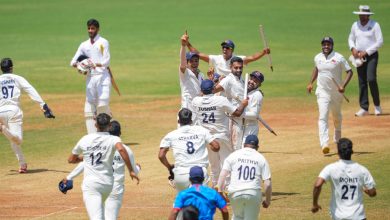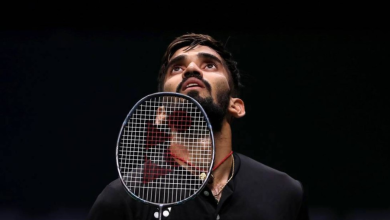From riding tongawala’s horse to Asian Games, how equestrian Ashish Limaye made the leap | Sport-others News

When the equestrian Ashish Limaye competes at the forthcoming Asian Games in Hangzhou, it will be the culmination of a remarkable journey that started with him picking up the sport while riding horses owned a tongawala (a driver of a horsedrawn cart). It is also a journey that was halted for a few years as he pursued engineering and resumed when he began training children to ride horses.Limaye — who hails from Pune but has been based in Europe for the past two years — has qualified to compete for India in the equestrian discipline known as eventing which tests horses and riders over a combination of three events: dressage, cross country and show jumping.The Pune resident’s earliest memories of himself riding a horse was from when he was just 10 and his parents had taken him to a small place run a tongawala where children would be allowed to ride horses during the summers.
“They used to have a summer camp of sorts near my house. And they would basically let kids ride horses in a circle at a small ground,” he recollects.
Limaye has been rubbing his eyes in disbelief after qualifying for the Asian Games, considering he switched to eventing from show jumping barely one-and-a-half years ago.
Eventing is where Fouaad Mirza had won a silver at the last edition of the Asian Games in Jakarta, becoming the first Indian equestrian to win an individual Asian Games medal since 1982.
Unlike Mirza, who hails from a long line of horsemen, Limaye’s parents were doctors. That camp was enough for them to realise how much he loved riding horses. Soon, at the recommendation of a relative, they took him to Arjuna Awardee Col. JM Khan, who used to be a prominent equestrian coach in Pune.
But soon, he realised that taking up the sport professionally was a prohibitively expensive pursuit and decided to focus on studies instead. For nearly four years, as he pursued his engineering degree, Limaye put his passion on hold.
“When I was in Class XII and in four years of engineering college I was barely riding. I was related to the sport all throughout the break, but not competing,” he says.
the third year of engineering college, that itch to ride caught up once more.
“In the third year, I competed at the nationals. It was the only event I competed in that whole year. But once I got my degree, I returned to the sport fully.”
Limaye’s big ‘break’ came when Embassy International Riding School (EIRS), a Bengaluru-based riding institution, decided to take a chance on him.
“I was competing in India for a long time before they offered me a sponsorship. But as part of it, they wanted to see my work ethics. So they asked me to train kids at their Bengaluru facility. I worked there for two years before I was sent abroad to train,” he says.
Limaye calls that two-year stint training children one of his best opportunities. He was training about 20 of them at the EIRS facility, and they went on to compete at the age group level at the junior nationals.
“Not only was I at the best equestrian facility in India for civilians, but when I came to riding school, I had around 10 horses there. I could ride on five to 10 horses everyday. Before that, I didn’t really have access to riding on so many horses. To be honest, that stint put me on the map in India,” says Limaye.
He elaborates: “If you have one horse, you can ride on them for about an hour or so. But if you have 10, your own improvement happens much faster.”
Seeing his progress, EIRS decided to send him to Europe to train as he chased Asian Games qualification. Limaye has spent the last two months in France. Before that, he was based in Germany for two years.
Over the next few months, as the Asian Games come closer, the biggest challenge for Limaye will be deciding which horse he takes to Hangzhou, since he has made the cut astride two horses: Dinard Penguinan and Willy Be Dun.
“I really don’t know at the moment which horse I will take to China. I’m not inclined towards one at the moment. I’ll decide mid-September. It’s a good position to be in, to have a choice. Every time I have this conversation with my coaches on which horse to take, we inevitably come to the same conclusion that we should wait as long as possible,” he says.
Both his horses have different personalities, says Limaye.
“Dinard Penguinan is very, very sensitive. He can become really nervous and go into his shell. But, at the same time, he’ll follow everything you ask of him. He doesn’t normally make his own decisions. He’ll follow your decisions with closed eyes. On the other hand, Willy Be Dun has his own personality. He shows off a little more than Dinard. He has his own brain, so you have to be smarter in dealing with him. He’s bolder. But both are very competitive. It will be a difficult situation to choose one for sure,” he chuckles.







